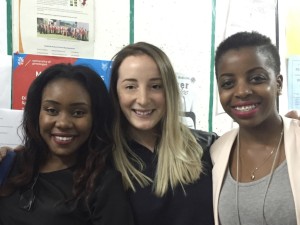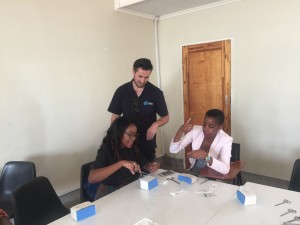Here at SWB we get lots of questions about who attends our programs. We thought it was time to give you an in depth look at some of our program participants. The following interview was conducted last month when the team was in Blantyre, Malawi.
Munashe and Daisy are final year medical students at the University of Malawi and completing their surgical rotation at the Queen Elizabeth Central Hospital in Blantyre. On their final day of SWB’s four-day seminar I sat down with this pair of wonderful students to find out about their motivations, fears and plans for the future.
Both young women find motivation from personal experience with unwell relatives. This exposure fueled a desire to help others and prevent the challenging aftermath a loosing a loved one to illness. Despite Munashe’s early dream of becoming a flight attendant and Daisy’s consideration of studying law, both have committed to the challenging, but rewarding life a doctor.
Transitioning from medical school to being a qualified doctor with responsibility poses plenty of challenges. Munashe is from Zimbabwe and will return home for her first job, where she will be speaking with colleagues and patients in a different language from that she has been using throughout her studies. In some sense she feels that this will be like starting again. For Daisy, the responsibility associated with being a junior doctor and having to trust her own abilities is a challenge that she can foresee. Having to make decisions and provide instructions for other health professionals is something that she hopes will get easier as she gains more experience. Despite the vastly different settings in which doctors can begin their career, these fears highlight the common anxieties experienced by those starting their career in medicine, regardless of where they are located.
Earlier during her studies Daisy thought she would leave Malawi to work overseas, but has come to value the role that she can play in improving medical care for her fellow Malawians where the ratio of doctors to citizens is 1 to 80,000. While she would like to travel and learn from colleagues around the world, she has a deep sense of obligation to her fellow Malawians and a desire to advocate for resources not currently available in places like Blantyre. She says she wants to learn from others around the world to ‘see what’s out there, but always come back’.
Their favourite part of the SWB seminars was the airway management workshop involving cricothyroidectomy, where small groups learnt the technique and then raced each other. This was a new skill for both Munashe and Daisy who were surprised at how straight forward the process was, a skill they could one day use to save a patient’s life. The small group sessions which formed the majority of the four days were also reported as a highlight and being much more engaging and beneficial than traditional lecture style teaching. Daisy also found the small group session covering x-rays to be incredibly useful and appreciated the enthusiasm displayed by the SWB teaching team. She also felt that while some of the topics covered during the seminars had already been taught in their course it was worthwhile hearing about these from a different perspective.
The SWB team hope to follow Munashe and Daisy as they commence their career in medicine to enable our team to gain understanding in what its like for new doctors making their way in an environment considerably different from that in Australia.


